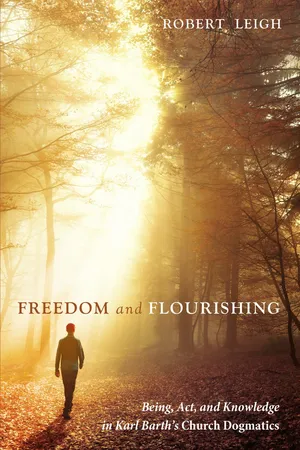![]()
Part B
Divine and Human Freedom in Asymmetrical Reciprocity in Church Dogmatics IV/3
![]()
3
Divine and Human Freedom in Asymmetrical Reciprocity
Being, Act, and Knowledge in Church Dogmatics IV/3
God Himself says I in this Other, so that, whether we realise it or not, the decision is made that God will accomplish His personal life-act only together with us, and we can accomplish ours only together with God.
—Karl Barth
God, for our sakes, “risks” his very identity, his continuity with himself. And if we are to take this at all seriously, the kinds of assumption about the freedom and lordship of God with which Barth is working in I/1 will need radical revision.
—Rowan Williams
Introduction
Having traced the development of Barth’s understanding of divine and human freedom in Part A, I now come to the core argument of the book. In this chapter it is argued that IV/3 represents the denouement of Barth’s engagement with the concept of freedom, offering his most fully participative and integrated vision of divine reality and human flourishing. Explicating Barth’s treatment of Christ’s prophetic office, Chapter 3 describes the divine and human realities as being ordered for freedom in asymmetrical, covenantal reciprocity. That is, the freedom of Christ the God-man represents a dialectical and unified freedom of God and humanity for one another. And the deeply participative nature of this text is grounded in a more thoroughgoing integration of the objective and subjective categories than in any other of Barth’s works.
In Chapter 1 it was argued that the early Barth posited something of a sharp distinction between God’s eternal objectivity (the divine essence in se) and God’s historical subjectivity (the revelatory existence ad extra), one-sidedly emphasizing the non-objectivity of God. This was intended to safeguard an appropriate distance between God’s sovereign being and fallible human subjects in the description of the event of theological knowledge. The result, however, was that Barth was unable to do justice to the historicity of God’s being-in-act. Moreover, Barth’s concern was rather exclusively with the question of theological knowledge, without also being sufficiently focused on the implications of God’s economy for God’s very identity. In IV/3 Barth treats of the munus propheticum, handling the relation of divine ontology and theological epistemology explicitly for the first time since volume I of the Dogmatics. By locating both of these themes in the history of the God-man, in a radical, actualistic way that was not achieved in the doctrine of revelation, Barth is able to say that the revelatory aspects of Christ’s life-act form a concrete part of the divine ontology, and not just an analogical repetition or divine self-interpretation. Barth thereby insists that the event of human flourishing through the knowledge of God is itself integral to God’s self-determination in covenantal lordship.
In this chapter I shall show i) that Barth overcomes some of the dualistic elements in his earlier works by stressing the irreducible importance of the simultaneity of Christ’s divinity and humanity. And ii) that this non-competitive vision of divine-human relations in IV/3 is underwritten by a willingness to view the revelatory subjectivity of the risen Christ and the Holy Spirit (the noetic aspect of reconciliation) as a function of God’s free ontological determination of divine and human reality in a pattern of reciprocity. In short, Jesus Christ’s self-witness as God-man not only reveals that God and humanity are reciprocally related, but, more specifically, that this revelatory history is the time in which Christ brings His own divine-human life-act to consummation by taking up human subjects into the event of God’s own life.
Jüngel is right to find that IV/3 “is Barth’s starting-point for overcoming the ‘object-subject schema.’” This observation indicates that in IV/3 something distinctive is taking place in Barth’s theological conception. In this text he is thinking in terms that take the subjective to be a function of the objective: “the revelatory dimension of the event [of reconciliation] . . . is not to be separated from that event.” It is not simply the case, as (it shall be seen below) numerous inadequate readings of IV/3 have suggested, that for Barth Christ vicariously achieves the unity of God and humanity in the incarnation and the cross, subsequently returning on Easter Sunday to relay dogmatic information about this event. Nor, as has also been erroneously suggested by some commentators, is human subjectivity simply the cognition of a series of soteriological propositions that mirror brute ontological facts actualized in abstraction from the event of human faith. Barth’s conceptualization of Christological and human subjectivity is far more sophisticated than such interpretations of IV/3 allow.
The development of Barth’s eschatology suggests that the divine-human unity established in Jesus Christ is not only a set of affairs to be cognized by human subjects, but a participative event taking place in the midst of complex world-occurrence, into which we are attracted by the Holy Spirit. As such, IV/3 sets up an asymmetrical reciprocity between Christ’s objective and subjective functions as mediator. The latter, whilst not identical with the former, is ingredient in it. The event of human subjects being attracted into participation in Christ’s life (through His revelatory power) is an integral part of His ontic actuality as God-man, and therefore part of the history in which God determines not to come to Godself without also coming to humanity. Taken together, and triadically (which is to say, as two distinct terms that form a mutually explicating pair), the objective and subjective sides of covenantal mediation serve to indicate that God and humanity may only be adequately thought in the historical unity in which they are reciprocally actualized through Jesus Christ. It is my argument (throughout Chapters 3, 4, and 5) that once readers of Barth overcome a false opposition between the fun...
